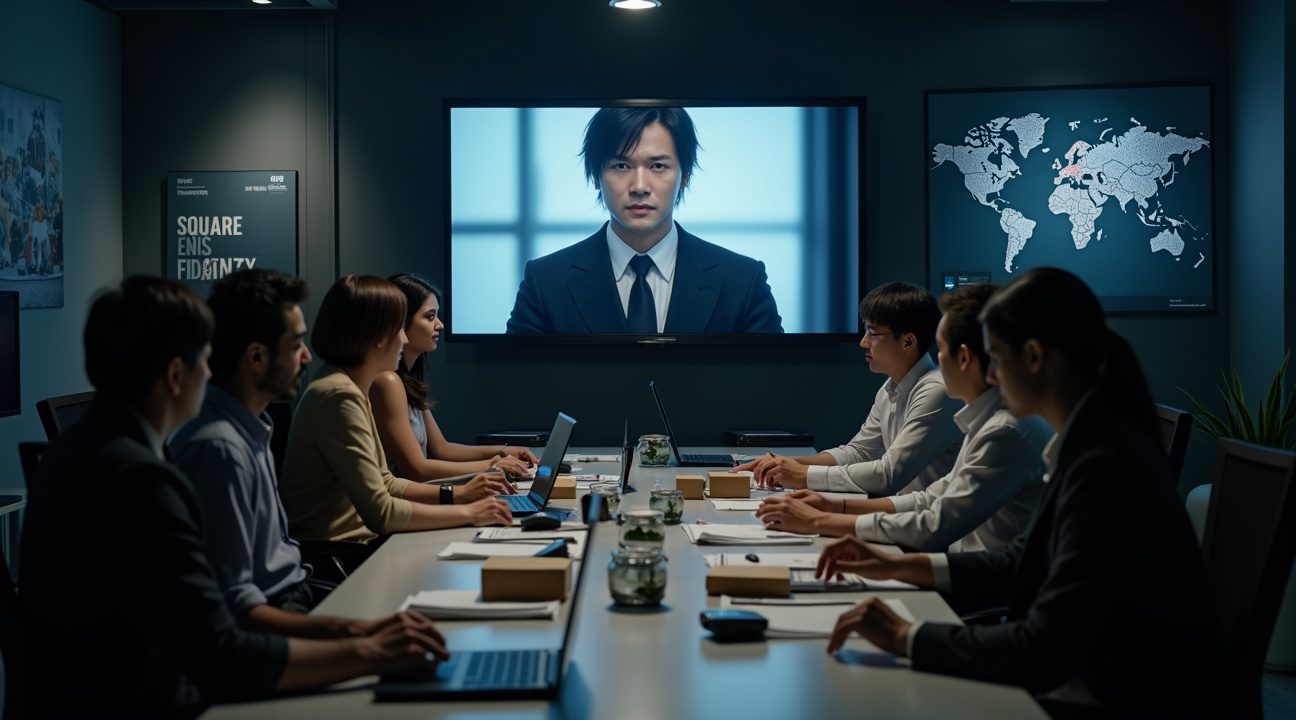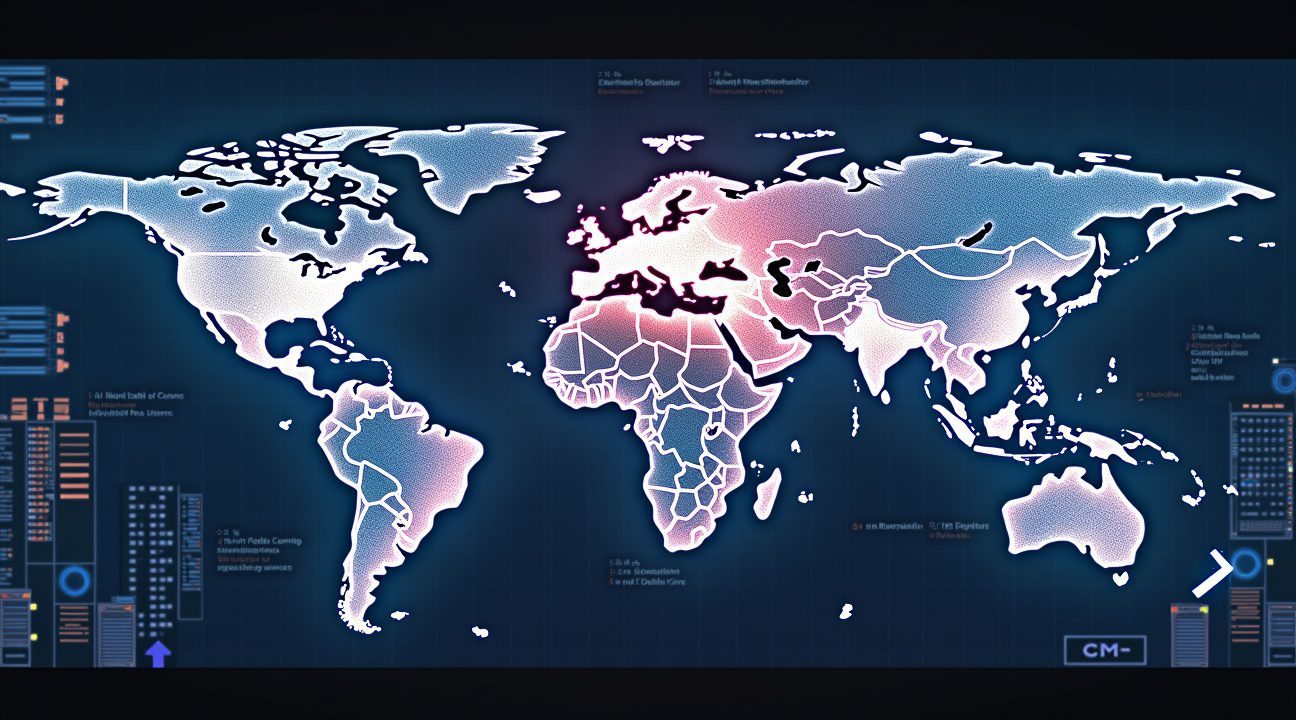Square Enix has announced significant workforce reductions across its Western operations while simultaneously unveiling an ambitious AI automation plan targeting 70 percent of quality assurance and debugging tasks by 2027.
Key Takeaways
- Mass layoffs impact Western operations – Square Enix cuts jobs across sales, marketing, publishing, IT, QA, and business planning departments in North America, Europe, and the UK, with over 100 employees already receiving termination notices.
- Aggressive AI automation targets set – The company plans to automate 70 percent of quality assurance and debugging tasks through generative AI by 2027, partnering with the University of Tokyo’s Matsuo Laboratory for research and development.
- Operations consolidating to Japan – Square Enix is centralizing its functions back to Japan, closing overseas development studios and reducing its HD games publishing divisions from 11 to just 4 units.
- Financial restructuring costs $76.8 million – The company projects spending 11.8 billion yen on restructuring but expects annual savings exceeding $19.5 million once the changes are complete.
- Leadership acknowledges past failures – President Takashi Kiryu admitted that previous overseas restructuring efforts failed to deliver expected results, marking the second consecutive year of substantial international staff reductions.
Square Enix Announces Mass Layoffs Across Western Operations
Square Enix delivered devastating news to its workforce through an all-hands video call led by President Takashi Kiryu, announcing sweeping job cuts across nearly every department of its Western business operations. The Japanese gaming giant’s decision affects employees in North America, Europe, the UK, and the US, marking one of the most significant restructuring efforts in the company’s recent history.
Scope and Scale of the Layoffs
The cuts span multiple critical business functions, leaving virtually no department untouched. Sales teams, marketing professionals, publishing staff, IT specialists, quality assurance personnel, and business planning experts all face potential job losses as part of this comprehensive downsizing initiative.
In the UK alone, approximately 137 positions are formally classified as “at risk,” though reports indicate that over 100 employees worldwide have already received termination notices. The company hasn’t disclosed the exact global headcount affected by these cuts, but the scale suggests a fundamental shift in how Square Enix plans to operate its overseas markets.
Affected employees learned of their fate on the same day as the announcement, creating immediate uncertainty for hundreds of workers who had been building careers with the Final Fantasy publisher. UK staff members entered a mandatory legal redundancy consultation period, following standard employment law requirements that provide some protection during large-scale layoffs.
Strategic Restructuring of Overseas Publishing
President Takashi Kiryu framed these layoffs as part of a fundamental restructuring of the company’s overseas publishing organizations rather than simple cost-cutting measures. This strategic pivot suggests Square Enix is reimagining how it approaches international markets, potentially consolidating operations or shifting focus to different business models.
The timing of these announcements reflects a broader trend affecting the gaming industry, where companies are reassessing their operational structures amid changing market conditions. Major gaming corporations have increasingly turned to workforce reductions as they adapt to new technological demands and shifting consumer preferences.
Square Enix’s decision to concentrate cuts outside Japan indicates the company may be prioritizing its domestic operations while scaling back international ambitions. This approach contrasts with other industry players who have expanded their global footprints, suggesting different strategic visions for navigating current market challenges.
The restructuring affects core business functions essential to game development and distribution, raising questions about how Square Enix will maintain its competitive position in Western markets.
- Marketing and sales teams play crucial roles in promoting major releases like Final Fantasy titles.
- IT and QA departments ensure games meet technical standards expected by modern audiences.
- Business planning departments, typically handling strategic initiatives and market analysis, now face cuts.
Their reduction could signal a shift in how Square Enix approaches market research and competitive positioning in overseas territories.
The company’s approach to this restructuring mirrors broader industry patterns where traditional gaming companies are reassessing their operational models. As artificial intelligence and automated systems become more prevalent in game development and publishing, some roles previously handled by human employees may become redundant or require different skill sets.
Square Enix joins a growing list of gaming companies implementing significant workforce reductions, reflecting industry-wide pressures to optimize operations while maintaining profitability. These decisions, while painful for affected employees, often represent attempts to ensure long-term viability in an increasingly competitive market where consumer spending patterns continue to evolve rapidly.

Aggressive AI Integration Plans Target 70 Percent Automation by 2027
Square Enix has charted an ambitious course for artificial intelligence integration, setting a bold target to automate 70 percent of quality assurance and debugging tasks through generative AI by 2027. This dramatic shift represents one of the gaming industry’s most comprehensive AI adoption strategies, fundamentally changing how the Final Fantasy publisher approaches game development.
The company’s partnership with the Matsuo Laboratory at the University of Tokyo demonstrates serious commitment to AI-driven innovation. This joint research initiative focuses specifically on enhancing development efficiency through advanced automation technologies. By collaborating with academic researchers, Square Enix gains access to cutting-edge AI methodologies while contributing real-world gaming industry insights to the research process.
Internal Innovation Drives AI Implementation
Square Enix has launched internal business idea contests to harness employee creativity for practical AI applications. These competitions encourage staff members to propose innovative ways AI can streamline operations across different departments. Several winning proposals have already progressed from concept to active development projects, showing the company’s willingness to invest in employee-generated solutions.
Key areas where AI implementation is taking shape include:
- Automated bug detection and resolution systems
- Intelligent testing protocols for game stability
- AI-assisted content generation for faster asset creation
- Streamlined localization processes for global releases
- Enhanced player behavior analysis for game balancing
President Takashi Kiryu has positioned AI adoption as a cornerstone of the company’s future strategy. His public statements and internal communications consistently emphasize an aggressive approach to integrating these technologies across all business operations. This top-down commitment ensures AI initiatives receive necessary resources and organizational support.
The gaming industry has witnessed significant changes recently, with major publishers making strategic adjustments. Microsoft’s Activision deal reshaped competitive dynamics, while Sony’s mobile gaming focus highlighted shifting market priorities. Square Enix’s AI strategy represents another major transformation within this evolving landscape.
The 70 percent automation target for QA and debugging tasks would revolutionize Square Enix’s development pipeline. Traditional quality assurance requires extensive human testing across multiple platforms, languages, and gameplay scenarios. AI automation could dramatically reduce testing cycles while maintaining or improving accuracy levels. Debugging processes would become more efficient as AI systems identify patterns and resolve issues faster than human developers.
Generative AI technologies offer particular advantages for game development beyond quality assurance. These systems can assist with creating textures, generating dialogue variations, and producing environmental assets. Square Enix’s approach suggests they’re planning comprehensive AI integration rather than limiting applications to specific development phases.
The company’s timeline reflects industry trends where publishers face pressure to reduce development costs while maintaining quality standards. Microsoft’s recent layoffs and EA’s game discontinuations illustrate how major gaming companies are reassessing operational strategies. Square Enix’s AI focus presents an alternative path forward, potentially maintaining workforce stability while improving efficiency through technology.
The Matsuo Laboratory partnership adds academic rigor to Square Enix’s AI development efforts. University research environments often produce breakthrough innovations that commercial companies can adapt for practical applications. This collaboration could yield proprietary AI tools that provide Square Enix with competitive advantages in development speed and quality.
Internal contest results transitioning into live projects demonstrates the company’s commitment to practical AI implementation. Rather than pursuing theoretical applications, Square Enix prioritizes solutions that directly improve current operations. This pragmatic approach increases the likelihood of successful AI integration while building internal expertise and confidence with new technologies.
President Kiryu’s aggressive stance signals that AI adoption isn’t optional but essential for Square Enix’s future competitiveness. The organizational reforms accompanying this strategy indicate structural changes designed to support AI integration at every level. This comprehensive approach positions Square Enix as a potential industry leader in AI-driven game development methodologies.
Major Operational Restructuring Consolidates Functions to Japan
Square Enix has initiated a significant restructuring plan that centralizes operations back to Japan while eliminating overseas development studios. The company’s strategy represents a fundamental shift in how it manages its global operations, affecting both publishing and development activities across multiple regions.
Studio Closures and Publishing Division Overhaul
The restructuring plan involves closing specific overseas development studios as Square Enix moves to centralize its operations. This consolidation extends beyond simple studio closures, as the company’s HD games publishing divisions face dramatic reduction from 11 down to just 4 units. The streamlined structure aims to increase efficiency by eliminating redundancies and creating clearer operational pathways.
Management has projected the financial impact of these changes at 11.8 billion yen, approximately US$76.8 million, for the fiscal year ending March 2026. While this represents a substantial upfront investment, the company anticipates generating annual savings exceeding 3 billion yen, roughly US$19.5 to US$19.6 million, once the restructuring completes.
Intellectual Property Management and Global Integration
A critical component of this operational overhaul involves globally integrating the management of Square Enix’s intellectual properties. Previously independent overseas subsidiaries will transfer control of their IP management functions to the centralized Japanese operations. This shift ensures consistent brand management and strategic decision-making across all markets while reducing administrative complexity.
The consolidation aligns with broader industry trends where major publishers are implementing cost-cutting measures and operational efficiency improvements. Square Enix’s decision reflects similar moves by other gaming giants who are reassessing their global footprints amid changing market conditions.
The Japan centralization strategy also affects how the company will develop and publish future titles. By bringing key functions under direct Japanese oversight, Square Enix expects to maintain better quality control and more cohesive creative direction across its portfolio. This approach contrasts with the decentralized model many publishers adopted during the industry’s rapid global expansion.
The restructuring comes at a time when gaming companies are facing increased pressure to optimize operations while maintaining competitive advantages. Sony’s recent focus on mobile gaming and other strategic shifts demonstrate how publishers are adapting to evolving market demands.
Square Enix’s operational efficiency improvements extend beyond cost savings to include:
- Better resource allocation
- Faster decision-making
- Clearer accountability structures
- Improved response to market changes
- More coordinated global marketing strategies
The company’s commitment to this restructuring plan indicates confidence in the long-term benefits despite the significant upfront costs. The projected annual savings of 3 billion yen represent ongoing operational improvements that compound over time, potentially offsetting the initial 11.8 billion yen investment within four years.
These changes position Square Enix to better compete in an increasingly competitive gaming market where operational efficiency directly impacts profitability. The centralized approach should also facilitate better integration of new technologies and development methodologies across all projects, ensuring consistent quality and innovation standards throughout the company’s portfolio.

Financial Struggles and Leadership Acknowledge Past Failures
Square Enix’s latest financial results paint a complex picture of mixed performance that has prompted significant organizational changes. The company reported net sales of 133.8 billion yen (around US$871 million) for the first half of fiscal year 2026, representing a concerning 15% decline from the previous year. However, operating income tells a different story, rising by 29% to reach 27.2 billion yen (approximately US$177 million).
These contrasting metrics highlight the company’s struggle to balance revenue generation with operational efficiency. While gaming industry consolidation continues across the sector, Square Enix finds itself grappling with declining sales despite improved profit margins.
Leadership Takes Responsibility for Strategic Missteps
Company president Takashi Kiryu has openly acknowledged that previous restructuring efforts in overseas operations failed to deliver expected results. This admission represents a significant departure from typical corporate messaging and signals genuine accountability from leadership. Past restructuring attempts clearly didn’t address fundamental operational challenges that continue to plague international divisions.
The current wave of layoffs marks the second consecutive year of substantial staff reductions in international locations. This pattern reveals persistent structural issues that extend beyond temporary market fluctuations. Similar struggles are noted across the industry, where companies face mounting pressure to streamline operations while maintaining creative output.
Key factors contributing to these ongoing challenges include:
- Misaligned resource allocation across global markets
- Ineffective integration of international teams with Japanese headquarters
- Overextension into markets without sufficient local expertise
- Failure to adapt content strategies for regional preferences
Square Enix’s situation reflects broader industry trends where traditional publishers must adapt to changing consumer behaviors and technological disruption. Companies like Sony have pivoted to mobile gaming, while others such as EA discontinue major franchises to focus resources elsewhere.
The timing of these layoffs coincides with Square Enix’s broader AI integration strategy, suggesting leadership views artificial intelligence as a solution to operational inefficiencies. This approach mirrors moves by other tech giants, including Microsoft’s recent workforce reductions amid similar restructuring efforts.
Despite the financial pressures driving these decisions, Square Enix has committed to supporting departing staff during the transition period. The company expressed appreciation for employees’ contributions and pledged assistance with job placement and severance packages. This supportive stance contrasts sharply with some industry layoffs that have left workers with minimal support.
Kiryu’s candid assessment of past failures suggests a more realistic approach to future planning. Rather than repeating previous mistakes, the company appears focused on identifying specific operational weaknesses that contributed to overseas underperformance. This level of self-reflection could prove valuable as Square Enix implements its AI-driven restructuring plan.
The financial data reveals that while Square Enix can still generate profits, its revenue generation capabilities have weakened significantly. This decline affects the company’s ability to invest in new projects and compete with better-funded rivals. Operating income improvements indicate successful cost-cutting measures, but sustainable growth requires addressing the underlying revenue challenges.
International operations remain a particular concern, with repeated restructuring attempts failing to achieve desired outcomes. Cultural differences, market dynamics, and competitive pressures in overseas markets have proven more challenging than initially anticipated. The company’s renewed focus on AI integration represents a potential solution, though execution risks remain high given past performance.
Square Enix’s acknowledgment of past failures, combined with concrete financial data, provides transparency that stakeholders can use to evaluate the company’s future prospects. Whether this latest restructuring effort will succeed where previous attempts failed depends largely on how effectively leadership addresses the root causes of international operational challenges.
Industry Reaction Highlights AI Automation Controversy
Industry watchers have closely examined the timing of Square Enix’s workforce reduction alongside its aggressive artificial intelligence initiatives, sparking heated discussions about automation’s role in gaming’s future. The convergence of these developments has intensified existing debates about whether AI technologies threaten traditional game development jobs or simply represent operational evolution.
Major gaming publications and industry analysts quickly highlighted the apparent contradiction between Square Enix’s simultaneous staff cuts and AI investments. However, Bloomberg reporting and insights from journalist Jason Schreier have clarified that the current layoffs stem from structural and financial pressures rather than direct AI job displacement. This distinction hasn’t prevented widespread speculation about the company’s long-term intentions regarding human versus artificial intelligence contributions to game development.
The situation becomes more complex when examining Square Enix’s recent public stance against certain AI applications. The company joined 17 other Japanese media firms in formally criticizing OpenAI’s Sora2 for generating content without proper authorization, demonstrating the nuanced position many entertainment companies maintain regarding generative AI usage. This dual approach—embracing AI internally while challenging external AI applications—reflects broader industry uncertainty about appropriate boundaries and applications.
Mixed Signals Fuel Automation Concerns
Gaming industry professionals have expressed mixed reactions to Square Enix’s apparent strategy of reducing headcount while expanding AI capabilities. Some developers worry about setting precedents that could influence other major publishers, particularly as companies across the sector face similar financial pressures and technological opportunities. The concern isn’t limited to Square Enix alone, as Microsoft’s recent layoffs and EA’s game discontinuations have created an atmosphere of uncertainty throughout the industry.
Employee advocacy groups have pointed to the timing as particularly troubling, suggesting that even if current layoffs aren’t directly AI-driven, the company’s public commitment to automation raises questions about future job security. Veterans in the industry note that previous technological shifts, from 2D to 3D graphics and from physical to digital distribution, ultimately created new opportunities even as they eliminated certain roles.
Market analysts maintain that Square Enix’s approach reflects practical business considerations rather than ideological positions about human workers versus artificial intelligence. The company’s financial performance and competitive positioning in an increasingly crowded marketplace likely drive these decisions more than technological capabilities alone. This perspective aligns with broader trends where companies like Sony focus on mobile gaming expansion and others pursue major acquisitions to maintain market relevance.
Critics argue that Square Enix’s public statements about AI integration create unnecessary anxiety among current employees while failing to provide clear guidance about which roles might be affected by future automation. The lack of transparency about specific AI applications and their potential impact on different development functions has contributed to speculation and concern within gaming communities.
Industry observers suggest that Square Enix’s experience may serve as a case study for how major entertainment companies balance technological advancement with workforce management. The outcome of their AI integration efforts, combined with the long-term effects of current staffing changes, could influence similar decisions across the gaming sector.
The controversy highlights fundamental questions about AI’s role in creative industries, particularly regarding tasks that require human judgment, artistic vision, and cultural understanding. While automation can handle certain technical processes efficiently, the creative aspects of game development continue to rely heavily on human input and interpretation.

Sources:
Anime News Network, “Square Enix Confirms Layoffs, Restructuring in N. American, European Publishing Operations”
GamesRadar, “Mass layoffs hit Square Enix hours after it shares plans to have AI handle ’70 percent’ of its quality assurance and debugging soon”
Nintendo Life, “Square Enix Hit By Mass Layoffs As Part Of Global Restructuring”
Video Games Chronicle, “Square Enix announces more layoffs as part of US and Europe restructuring”
The HR Digest, “Square Enix Announces Layoffs, Shifting the Blame Away From AI Ambitions”


